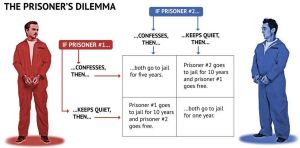Nash Equilibrium: Difference between revisions
(Created page with "'''In the prisoner's dilemma (game theory) the Nash equilibrium is the most common way to define the solution of a non-cooperative game involving two or more players.''' Stro...") |
No edit summary |
||
| Line 1: | Line 1: | ||
[[File:Prisoner-dilemma.jpg|alt=Prisoner-dilemma|thumb|Prisoner-dilemma]] | |||
'''In the prisoner's dilemma (game theory) the Nash equilibrium is the most common way to define the solution of a non-cooperative game involving two or more players.''' | '''In the prisoner's dilemma (game theory) the Nash equilibrium is the most common way to define the solution of a non-cooperative game involving two or more players.''' | ||
Latest revision as of 02:22, 19 April 2022
In the prisoner's dilemma (game theory) the Nash equilibrium is the most common way to define the solution of a non-cooperative game involving two or more players.
Strong militaries require strong economies. If a country transitions their economy to renewables too early, they leave themselves vulnerable to countries who transition later -or not at all. The Nash equilibrium is a concept within game theory where the optimal outcome of a game is where there is no incentive to deviate from the initial strategy. More specifically, the Nash equilibrium is a concept of game theory where the optimal outcome of a game is one where no player has an incentive to deviate from their chosen strategy after considering an opponent's choice.
Why would a country choose to weaken itself militarily when another country might use this weakness to take advantage? It seems, the best way to play the game would be to encourage other countries to transition to renewable energy first, with little intention of doing so yourself. This would be a great way to gain a strategic advantage in geopolitics. Isn't this what is actually being played out in international politics? I hear a lot of world leaders espousing green energy and net zero rhetoric. I see a lot of posturing. But, most countries are doing very little. Since America, Russia, China and all of the other players are aware of this game, no country is willing to take the risk. To do so, would be to make your country weak and vulnerable for exploitation or even attack.
Sadly, this is the real reason why climate advocacy is failing. The world needs to find a way to trust each other. Unfortunately, it is clear that we are headed full speed in the wrong direction.
